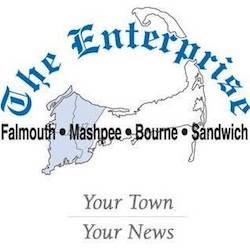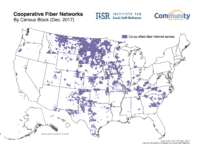An Advantage on the Cape
Even though Falmouth doesn’t have its own electric utility, as do many towns that ultimately develop municipal broadband networks, the city already has an edge — fiber from nonprofit OpenCape already connects approximately 40 municipal facilities and other community anchor institutions (CAIs). David Isenberg, a resident and former FCC senior advisor, helped organize the meeting and noted that the OpenCape infrastructure will provide an option for better connectivity in the community:
“There is a lot of OpenCape infrastructure in Falmouth that is already here for us to use,” Mr. Isenberg said.
OpenCape could hypothetically manage the community-based fiber-optic network, he said. Other options include the Town of Falmouth, a utility district, the Economic Development and Industrial Corporation or a public/private partnership. A feasibility study would determine the viability of those options.
 David Talbot from CTC Technology and Energy was on hand to discuss what sorts of issues a feasibility study would address. A study would help the city determine what assets they have that can facilitate a community network, identify where the existing infrastructure’s gaps are, create a basic network design, and offer a strategy and cost estimates.
David Talbot from CTC Technology and Energy was on hand to discuss what sorts of issues a feasibility study would address. A study would help the city determine what assets they have that can facilitate a community network, identify where the existing infrastructure’s gaps are, create a basic network design, and offer a strategy and cost estimates.
Isenberg suggested a Fiber-to-the-Home (FTTH) network in Falmouth would cost about $30 to $60 million to deploy, but that with sufficient support, the city could find financing. He told attendees:
“The way a community gets a network is primarily through community support,” Mr. Isenberg said. “We can do it together, but it will not be done for us. What has to come first, what has to be the basis for a community network is the community.”
Better Reliability, Economic Development, Local Support
 In the summer of 2018, Comcast and Verizon inspired their subscribers to consider the possibility of a community network. There were multiple outages from both companies, including a five-day outage that left Verizon DSL subscribers offline. Falmouth businesses that purchased Internet access from Comcast found it difficult to process credit card transactions.
In the summer of 2018, Comcast and Verizon inspired their subscribers to consider the possibility of a community network. There were multiple outages from both companies, including a five-day outage that left Verizon DSL subscribers offline. Falmouth businesses that purchased Internet access from Comcast found it difficult to process credit card transactions.
Local news outlet The Falmouth Enterprise published an editorial on May 30th encouraging local residents to keep an open mind about the possibility of a municipal network in Falmouth. In addition to the possibilities that better connectivity might bring for the local economy, editors write, the city will have more control over matter such as network neutrality and household rates for Internet access.
We imagine most Falmouth taxpayers will hesitate when they hear of the possible cost of creating a municipal system. But they should hear this group out. A municipal system could save money in most households with lower monthly access fees.
Tuesday’s meeting will be a good starting point. We hope this group gets the community’s ear as it moves forward.
The Enterprise has also provided information about municipal networks to local readers by writing about several networks in the U.S., including those in their region, such as Concord and Norwood. They’ve offered facts on economic development and other benefits in Chattanooga.
Shoring Up Support
Local Courtney F. Bird is leading the efforts toward a muni. He’s consulted with Isenberg to come up with the preliminary cost estimate and he brought the idea to the Falmouth Economic Development and Industrial Corporation (EDIC) in April. He was pleased by the number of people who turned out in the city of almost 32,000 people and offered guidance for next steps:
“To see this turnout is great, and it’s a great first step,” organizer Courtney F. Bird of Sippewissett Road said. “That is what we need, and we now need you all to go out and sell it your friends, because it is going to be a slog for a little bit. Yes, there will be a feasibility study, but there also needs to be lobbying of our selectmen, there needs to be convincing of all of those people in Town Meeting that raise money, that set the taxes, that vote the priorities. They need to hear from people like you that this is important.”
On June 11th, the EDIC revisited the issue and voted unanimously to commit $50,000 toward a feasibility study.
A few days later, local citizens organized to form a group named the Falmouth Community Network published their support for the decision. They noted that committing funds for a feasibility study doesn’t create guarantees but will bring the information that community craves. The group also recognized that engaging in a feasibility study will put Comcast on notice and may encourage the company to improve service in the area.
The vote by the EDIC to commit $50,000 to a feasibility study of bringing municipal broadband to Falmouth was a bold move. It was, without a doubt, a good move; the idea of closing the gap between the OpenCape fiber optic network and residences and businesses has been out there for some time.
…
A municipal fiber network will require up-front expense. It will be easier to go to Town Meeting for funding with arguments already laid out in a feasibility study. But it will still be a bold move.
Image credit ToddC4176 at the English Wikipedia [CC BY-SA 3.0]
This article was originally published on ILSR’s MuniNetworks.org. Read the original here.





